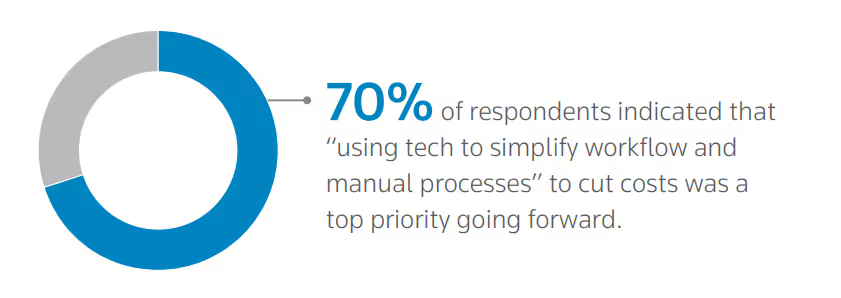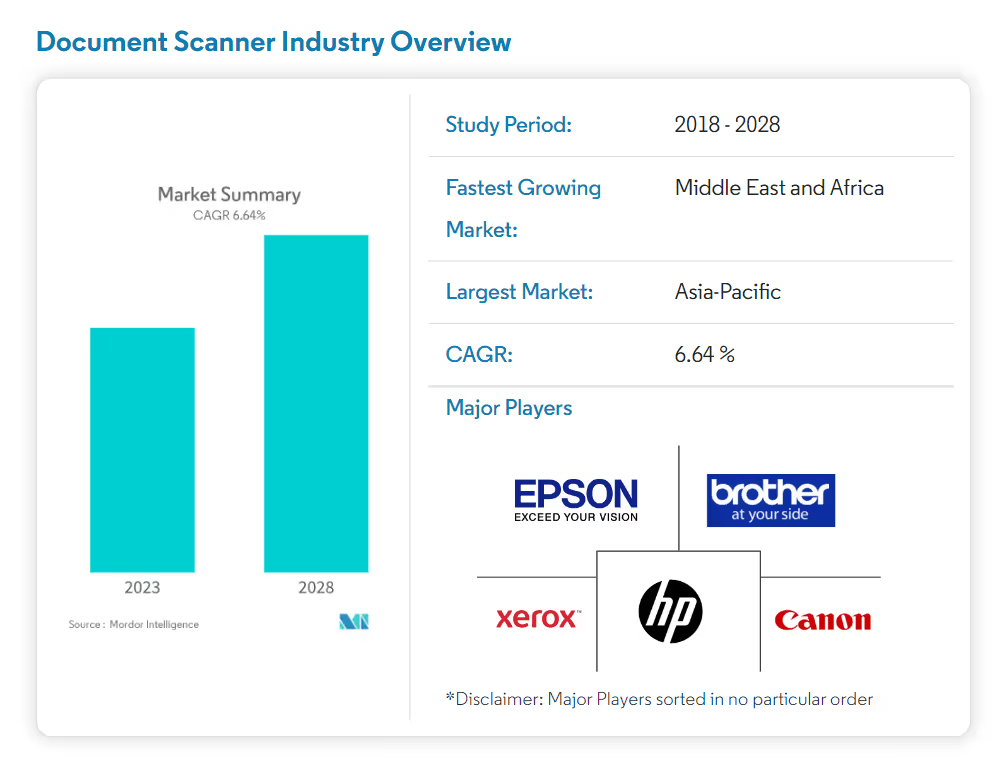Digitization of documents: what it is and what are the benefits for your business
Document digitization is a fundamental transformation in the way companies manage their documents, information, and processes. Not only does it help to make businesses more efficient, it also offers numerous benefits, ranging from the preservation of important documents to a multitude of specific demands.
Um study from Gartner concluded that digital transformation is an organizational priority for 87% of senior executives. At its core, digital transformation means using technology to improve business processes, drive growth, and improve the customer experience.
In the legal sector, for example, Legal Market Report, released by Thomson Reuters showed that 70% of the organizations interviewed aimed to use technology to simplify workflows and processes handbooks.

Now, if managing multiple paper records can be time-consuming, exhausting, and less efficient, why not take advantage of this movement to, instead of storing thousands of records on shelves, files and boxes, digitize them and optimize the daily activities of your business?
What is document digitization?
Document digitization is the process of transforming physical documents into digital format, storing them in electronic systems to facilitate their retrieval, sharing, and use.
This is done through direct scanning or scanning, where the document is converted into a digital file that can be stored on servers or in the cloud.
This applies to receipts, orders, reports, and many other certificates that are present in a company's daily life that were archived analogically.
Scanned documents and digital documents: is there a difference?
If you deal with documents on a daily basis, you may have seen the terms “scanned documents” and “digital documents” as synonyms. However, in their essence, there is a fundamental difference between these files:
- scanned documents are files that were originally printed on paper and then added to the virtual environment, either for storage or to send to a third party;
- digital documents are certificates already created in a virtual environment, which can replace paper versions. For example, there are digital social security numbers and IDs that are issued by official government bodies and have the same legal validity as their counterpart.
Are scanned documents legally valid?
The scanned documents alone do not have the same legal validity as the original file, since the signatures were made by hand and would only be scanned.
However, if you wish to transform this file into something valid to be used in administrative and judicial proceedings, there is a quick and easy way to do so: the electronic signature.
Through electronic signatures, it is possible to guarantee a form of proof of the authorship and integrity of digital documents through a secure, simple and 100% online procedure.
At Clicksign, for example, the electronic signatures made have all the necessary elements to comply with the requirements of legal validity, as provided for in MP 2,200-2/01 and Law 14,063/2020, such as the Document Log (which records the Signators' authentication points) and the Code Hash (which guarantees that the document was not changed after signing, thus remaining intact).
Provided it is done correctly, the courts have confirmed that the image and the digitization are as legally binding as paper documents. The legal acceptability of scanned images of the documents depends on the process used to create the documents.
However, it should be noted that the legal validity of scanned documents may vary from country to country and according to local laws. For this reason, it is important to always consult a lawyer or specialist in the matter to ensure the validity of the scanned documents in question.
Why digitize documents for companies?
Document scanning services have been growing gradually in recent years and are expected to expand to a CAGR (compound annual growth rate or compound annual growth rate) of 6.64% between 2023 and 2028, according to Mordor Intelligence.

Undoubtedly, this growth is due to the need of the corporate environment to find solutions capable of shortening processes and making the work model more flexible in industry 5.0, whether in educational institutions, virtual clinics, accounting offices, real estate agencies, banking institutions, or any other branch of industry.
From reducing clutter to improving productivity across the office, digitizing documents can help in a variety of ways, we've listed some of the key advantages for your business:
1. Prevents paper waste
The first point to be highlighted is the savings made with sheets of paper when implementing document digitization. As the unit price of each sheet is in the order of cents, you may have never mastered how much is spent monthly on this material. However, if you put it on the tip of the pen, it is a considerable amount that can be avoided.
In addition, reducing the use of paper is a way of preserving the environment, providing sustainability and reducing the carbon footprint, which can be a major competitive advantage of your company vis-a-vis the public.
Um study conducted by Sensormatic Solutions It showed that almost 80% of American consumers consider sustainability (of a product, retailer, or brand) when making at least some purchases and 70% said they would change their buying habits if they discovered that a store or brand was not operating sustainably.
“One of the first things the research pointed out is that the environment and sustainability are in consumers' minds.”
Steve Ashkin, President of The Ashkin Group
In other words, today's consumers are increasingly aware and prefer to buy from environmentally friendly brands, which is why it is crucial to adopt measures to meet this expectation.
2. More control over documents
Keeping a stock of paper documents means more work when it comes to finding the file you need. No matter the type of cataloguing done in your company, even if the files are well separated and defined, it will still be difficult to find an older document when necessary.
With the digitization of documents, control over each file is much more evident, allowing faster access to important information and increasing the efficiency and productivity of your team.
In addition, you can access important information from anywhere, anytime, as long as you have internet access.
This facility may even be one of the starting points for implementing the Digital HR in your business.
3. Space savings
We know that maintaining a physical office with enough space to accommodate all employees, furniture, meeting room, and even storing documents can be very expensive.
When digitizing documents, it is possible to store them on servers or the cloud, eliminating the physical space and closets that were previously intended for papers.
In addition, digitization can also contribute to the preservation of important information and the reduction of costs by freeing up the environment for other company needs.
4. Increased productivity
There's an old saying that “time is money”. Imagine, then, the money that is lost searching for bulky and disorganized records, which you don't even know if they still exist.
With digitization of processes and the storage of electronic documents, your precious time can be used in more productive and strategic activities.
Likewise, this modernization saves the time of sending a certificate between branches or employees, because in just a few clicks the content of a particular item can be sent to someone miles away.
5. Facilitates the routine of all sectors
One of the advantages of digital documentation is that there is greater organization in the storage of information. Thus, when it is necessary to deal with the various types of documents produced by a company, the work is much more agile and simple.
Think of companies with remote or hybrid work, such as Are communication and reports passed on if we don't have scanned documents? In the same way, management is compromised if it is unable to find the incoming and outgoing records quickly.
Companies such as those in the education sector, for example, that deal with student documents on a daily basis, such as enrollment, report cards, or other registrations, gain a lot in organizing with digital files. After all, it's easier to gather the different documents and pass them on to the activities of each sector.
6. Improved security
Scanned documents can be protected by passwords and encryption, ensuring the security of sensitive company information.
More than that, with digitization, it is possible to protect data against loss, corruption, and destruction, ensuring its integrity.
7. Customer service taken to another level
There is currently a demand for quick answers. Digitization provides your employees with instant access to information, allowing customer requests to be answered with greater speed.
In addition, digitized information allows employees to have access to valuable data that can be used to provide a more personalized and efficient service.
As a result, your business will provide improved levels of service, benefiting from increased customer satisfaction.
8. Disaster recovery
Paper records are vulnerable to multiple threats. Due to the lack of backup to physical storage, most companies hit by a natural disaster never recover.
Therefore, the digitization of your files must be part of your business continuity plan, since it makes it possible to recover from an accident, such as floods or fires, with the least possible interruption for your customers.
9. Attention to compliance regulatory
Many industries are regulated by laws and regulations that require the preservation of documents for specific periods. Scanning documents can help meet these requirements, preserving important information for a long time.
On the other hand, they can also be easily retrieved and reviewed in the event of an audit, which means that undertakings Enterprise can respond more quickly to regulatory questions.
That said, by storing information securely and accurately, facilitating auditing, and following privacy, document retention, and security regulations, companies can minimize the risk of regulatory sanctions and improve their reputation in the market.
10. Improved decision-making
According to global research from McKinsey, only 20% of the companies interviewed consider that they have excellent decision-making.
The digitization of documents, in this scenario, allows the automatic capture of data, which can be easily analyzed to identify trends and insights powerful for more assertive decision-making and Data-driven.
For example, a retail company that digitizes all of its financial documents, including invoices, invoices, and bank statements, can quickly analyze the company's expenses and revenues to make informed decisions about future investments and expenses.
Likewise, this technology helps reduce human errors, such as the loss or corruption of information, ensuring decisions based on accurate and reliable information.
How about implementing this technology in your business today? Clicksign is the ideal solution to accelerate your company's growth! If you also want to master document digitization and revolutionize your processes, click here and talk to an expert.



.jpg)

.avif)




